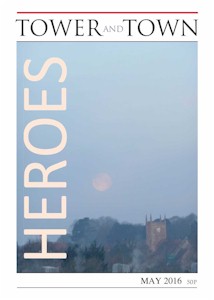

Tower and Town, May 2016 (view the full edition) (view the full edition)John McEnroeIn 1981 I was nine and John McEnroe won Wimbledon for the first time, beating Björn Borg. This followed their epic encounter in the 1980 final, scene of perhaps the greatest ever tie-break - 20 minutes long, which McEnroe won 18-16, heroically saving 5 championship points. The early 80's was a golden era of tennis with three of the all-time greatest players, McEnroe, Lendl and Connors, playing out memorable encounters. My parents and their friends at Ramsbury tennis club watched Wimbledon avidly; their enthusiasm was infectious and I took a keen interest in playing and following tennis. Nobody who watched tennis at that time could fail to have a view on McEnroe and he certainly polarised opinion. I did not know at the time what it was about his tennis that so captivated me. I am not sure that I know now exactly. At the age of nine I knew little about the game of tennis, but I could tell there was something so different about McEnroe from other players - he just didn't play tennis like it was supposed to be played. He didn't stroke the ball like one is taught to, he seemed to 'swat' his forehands; he served with his back to his opponent, generating extreme slice and in doing so would drag a trench with his toe behind the service line on the grass court. He was not powerful, but had cunning disguise over the direction of his shots. Above all though, he had the most sublime touch with volleying, especially the drop volley. As I was writing this it was troubling me that being (very, very) good at tennis seems rather unworthy of being deemed a hero when considered against, for example, acts of selfless bravery in life-threatening circumstances. However I will console myself that, although a tennis player does not operate on a battlefield as did ancient Greece's heroes - the original heroes - a sporting encounter is often metaphorically referred to as a battle. The classical heroes, celebrated for their prowess in battle, often carried a fundamental flaw. McEnroe had a very obvious flaw, his temper. McEnroe would have been a fantastic character in a Greek tale. One could almost imagine the gods teasing and tormenting McEnroe, goading him into one of his infamous outbursts, where he could seem seconds from self-destructing in an incandescent rage against a line call (and sometimes did); but then the double-edged sword of that fearsome anger blended with a gritty New York determination to win and sublime skill would enable him to overcome his opponent. McEnroe's superlative skills and enthralling character were thrilling and for me. His inspirational performances made me want to emulate his play in that early period in my life when one has the potential, the time and the self-belief to dream of being like one's hero. Peter Osmond |